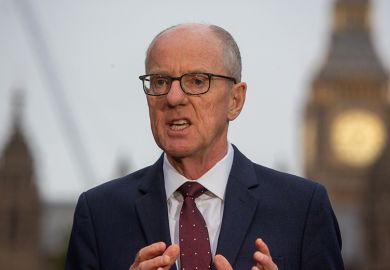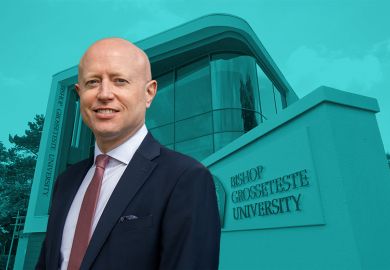Driven to distraction: Peter Strike fears for the future of teacher training
The speed with which School Direct, the government’s new teacher training policy, is being introduced risks damaging the quality of instruction, a university head has warned.
The University of Cumbria is one of the higher education institutions engaging with the scheme, under which schools themselves recruit trainee teachers. Peter Strike, Cumbria’s vice-chancellor, said he feared that diving in “as deeply as we have in such a short space of time” meant that quality issues were not being addressed. This risked damaging the reputation of universities providing training for the programme, he added.
“At the end of the day, the quality of the programmes sits with us and our judgement; these are our degrees, we sign them off and the Quality Assurance Agency will be looking at us to make sure that we’ve got them right,” he said.
Professor Strike added that the financial constraints placed on university teacher training providers was making it difficult to ensure quality and stability. He said that Cumbria had lost 60 per cent of its “core” places for students taking PGCEs “at a stroke” last year.
“That’s a drop of 200 students in one go. The sheer mass of the finances means that on a School Direct model, we see about 50 per cent of the income per student we saw from our own core provision,” he added. “We’ve got 360 extra School Direct places, so we are teaching twice as many students on a resource that’s half the amount per head compared with the old model. We’re having to make our provision much more generic than it has been in the past and leave the specialist stuff to the schools.”
There are also concerns that the Department for Education could switch more core places to School Direct this year, Professor Strike said, although so far he has been left in the dark about the possibility.
If there is further change, Cumbria may have to let more staff go, he said, adding to the “significant numbers” lost already.
The ultimate consequence, the vice-chancellor warned, was that initial teacher training would no longer be financially viable for universities.
“I have no way of smoothing the financial consequences of this out – if you lose two-thirds of your secondary PGCE provision, that’s £2 million of expenditure. What do I do, create that out of thin air?” he asked.
“We’re robust enough to carry it financially, but we might not have been. There must come a point when initial teacher training is no longer financially attractive to universities. When that point might or might not arrive, I don’t know.”
Register to continue
Why register?
- Registration is free and only takes a moment
- Once registered, you can read 3 articles a month
- Sign up for our newsletter
Subscribe
Or subscribe for unlimited access to:
- Unlimited access to news, views, insights & reviews
- Digital editions
- Digital access to THE’s university and college rankings analysis
Already registered or a current subscriber?




